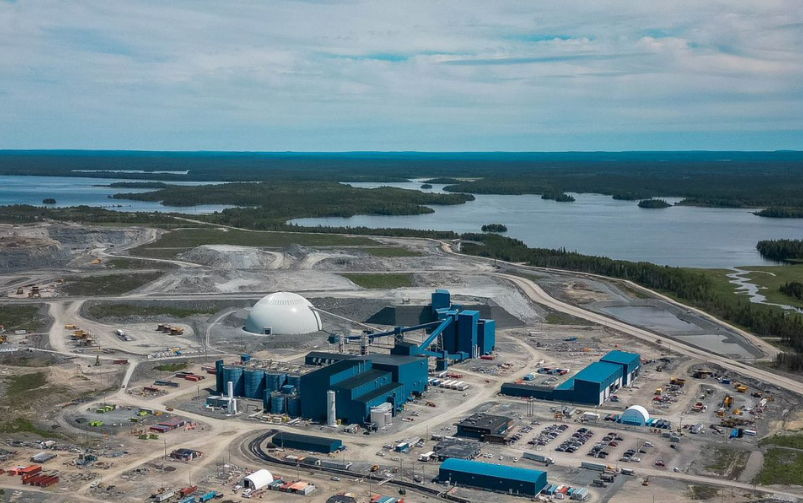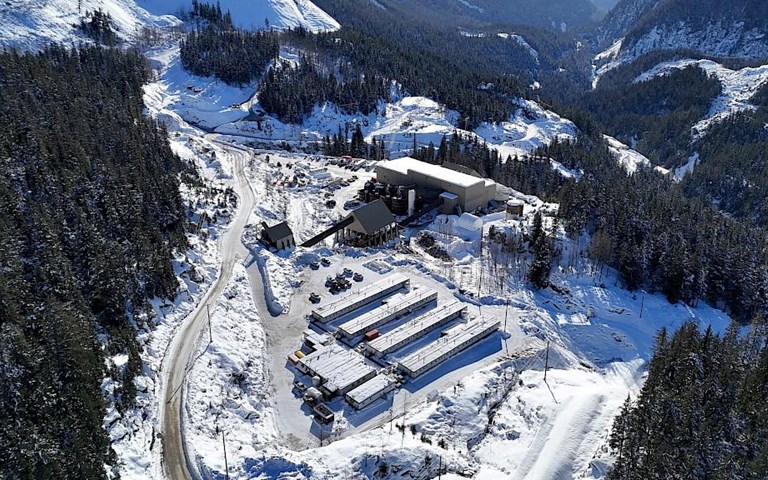Ascot Resources is planning to reboot commercial operations later this year at the historic Premier gold mine, which closed in the early 1950s. Courtesy of Ascot Resources.
Welcome back to your weekly mining news recap, where we catch you up on some of the news you may have missed. This week’s headlines include Teck Resources’ jump in copper production, Honda and Canada’s recent investments into the country’s electric vehicle (EV) supply chain, and Champion Iron contemplates expanding production capacity at its Bloom Lake mine.
Gold and silver miner Ascot Resources shared that it had poured first gold on April 20 at its Premier gold mine, located in B.C.’s Golden Triangle. Ascot is aiming to begin commercial production during the third quarter of this year. Once the mine is in its commercial phase, it is expected to yield 1.1 million ounces of gold and three million ounces of silver over eight years, according to its 2020 feasibility study.
Deputy Prime Minister Chrystia Freeland told reporters that Canada and its allies are considering trade measures against Indonesia, for flooding the market with cheap nickel, and China, due to its control over many nickel operations, as reported by The Globe and Mail. The oversupply of nickel from Indonesia has already led to a significant number of nickel miners reviewing or suspending their operations.
BHP Group has made an unsolicited bid worth US$38.8 billion for Anglo American, which could result in the world’s largest copper miner—providing 10 per cent of global copper output—if the two companies merge, as reported by Reuters. BHP has offered Anglo’s shareholders an all-share deal at US$31.39 per share, but it would require Anglo to first spin off its iron ore and platinum assets located in South Africa. According to Reuters, Anglo has rejected BHP’s offer because it undervalues the company.
Honda is investing $15 billion to establish Canada’s first comprehensive EV supply chain in Ontario, as reported by the National Post. A combined investment of $15 billion, $5 billion of which provided by the federal and Ontario governments, will be used to fund the construction of four new manufacturing plants in the province.
The Metals Company (TMC) and SGS Canada have extracted what they said is the first nickel sulfate derived exclusively from seafloor polymetallic nodules, as reported by Canadian Mining Journal. Using TMC’s samples of nickel-cobalt-copper matte, SGS’s extractive metallurgy team tested TMC’s hydrometallurgical flowsheet, producing the nickel sulfate directly from the high-grade nickel matte without making nickel metal. TMC stated the development proves that its “custom flowsheet configuration can be deployed to process these remarkable rocks into final products suitable for use in batteries.”
Magna Mining is set to begin test mining at the past-producing Crean Hill nickel and copper mine in Sudbury, Ontario, later this year, as reported by Northern Ontario Business. The company purchased the dormant mine 17 months ago, and Magna recently received all approvals and permits necessary to begin advanced underground and surface exploration activities. The company plans to extract and crush 400,000 tonnes of mineralized rock before shipping it to Vale Base Metals to be processed.
Teck Resources announced a 74 per cent rise in its copper production in the first quarter of 2024 compared to Q1 2023, which was greatly influenced by the continued ramp up at its Quebrada Blanca (QB) operation in Chile, as reported by Engineering News. A total of 99,000 tonnes of copper was produced in the first quarter, with 43,300 of that total stemming from QB. The company’s 2024 production guidance is 465,000 to 540,000 tonnes of copper, a significant increase from the 296,500 tonnes of copper it produced in 2023.
Champion Iron is mulling over a potential expansion of production capacity at its Bloom Lake iron ore mine in Quebec, as reported by Engineering News. The investments needed to increase production capacity past the current nameplate capacity of 15 million tonnes per year are currently being evaluated by the company’s technical team.
An agreement inked on Feb. 1 between B.C.’s Nisga’a Nation and Vega Mining Inc. will see Canada’s largest majority Indigenous-owned public company form over the coming months, as reported in the March/April issue of CIM Magazine. Vega Mining, which will be majority owned by the Nisga’a Nation and will eventually be renamed Nations Royalty Corp., will acquire the rights to five annual benefit payment entitlements stemming from five projects located in B.C.’s Golden Triangle region in exchange for common shares in Vega Mining’s capital.
The Dig Deep program at Agnico Eagle’s Detour Lake mine in Ontario is an employee-led initiative that encourages workers to engage in open discussions around mental illness and substance abuse, as reported by Mackenzie Patterson for the March/April issue of CIM Magazine. The program, launched in 2021, now has almost 50 volunteers who offer mental health support to their coworkers.
That’s all for this week. If you’ve got feedback, you can always reach us at editor@cim.org. If you’ve got something to add, why not join the conversation on our Facebook, Twitter, LinkedIn or Instagram pages?




